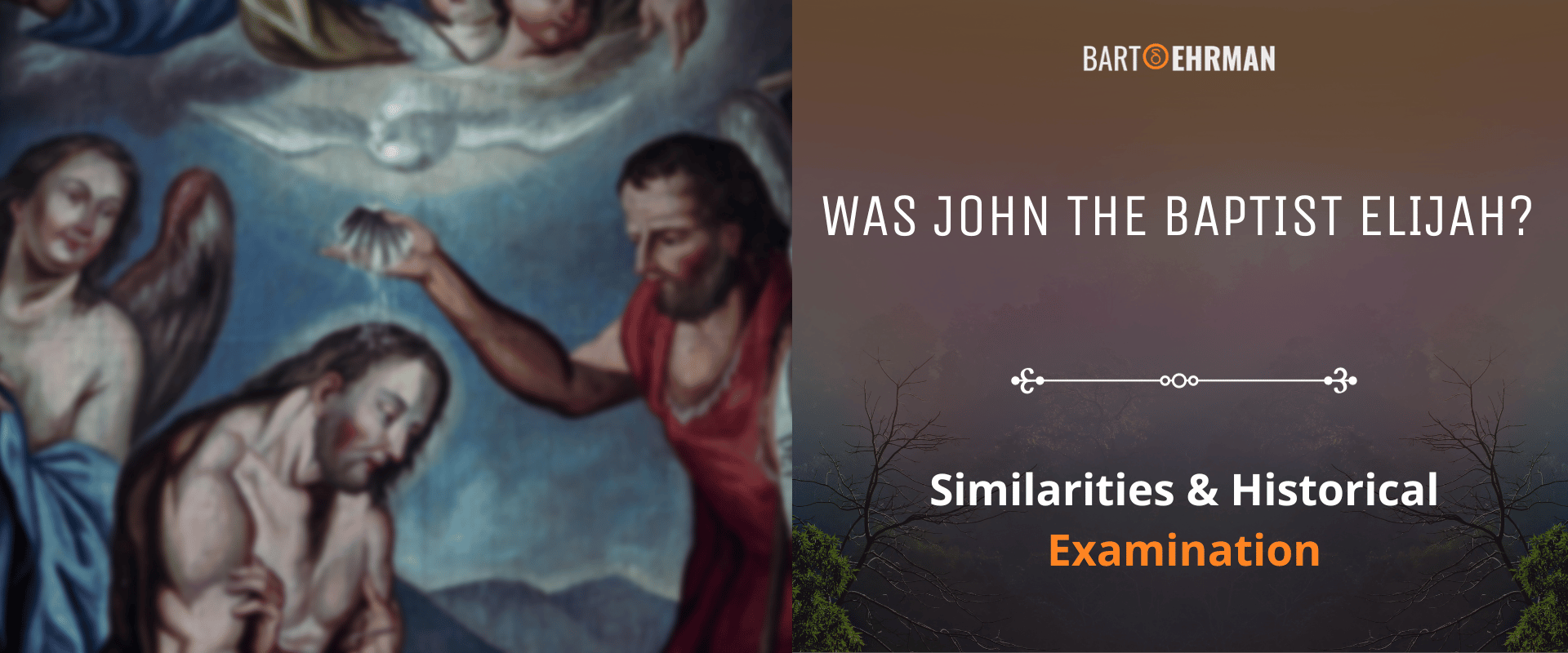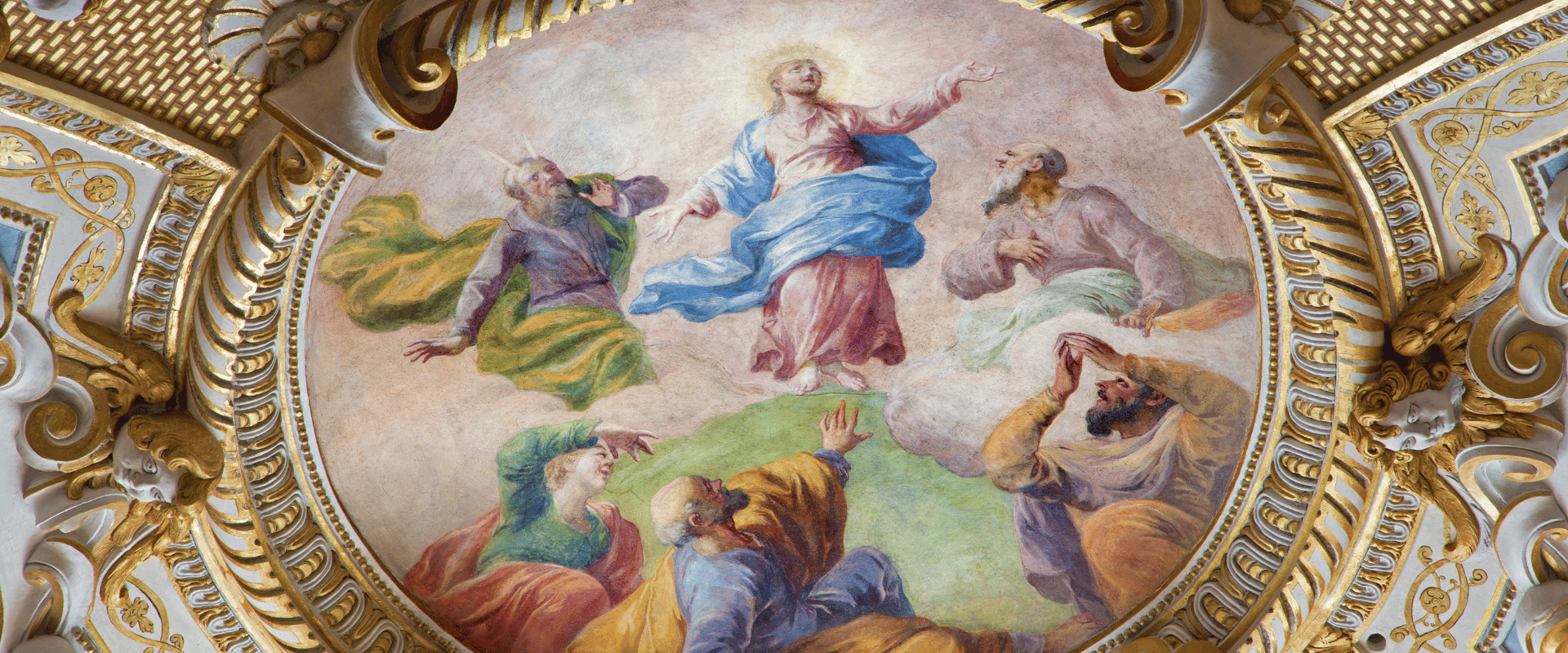Was John the Baptist Elijah? (Similarities & Historical Examination)

Written by Joshua Schachterle, Ph.D
Author | Professor | Scholar
Author | Professor | BE Contributor
Verified! See our editorial guidelines
Verified! See our guidelines
Date written: October 10th, 2023
Disclaimer: The views and opinions expressed in this article belong to the author and do not necessarily match my own. - Dr. Bart D. Ehrman
Was John the Baptist Elijah? Since there are a few cryptic verses referring to this in the Synoptic Gospels, some have asked this seemingly odd question. But who was Elijah in the Bible? Why was John the Baptist referred to as the second Elijah? Did ancient Jews believe in Elijah’s reincarnation? In this article, I’ll dive into these questions.

Who Was Elijah in the Bible?
Elijah is rather abruptly introduced in 1 Kings 17. A king of Israel named Ahab marries a foreign woman named Jezebel who convinces him to worship the god Baal instead of Israel’s God Yahweh. Chapter 17 says this:
Now Elijah the Tishbite, of Tishbe[a] in Gilead, said to Ahab, “As the Lord the God of Israel lives, before whom I stand, there shall be neither dew nor rain these years, except by my word.”
Elijah is clearly a prophet here, speaking for Yahweh. But can we know anything about his background?
The Bible calls him “Elijah the Tishbite of Tishbe in Gilead.” We know that Gilead was the name of a mountainous northern region of Israel but there is no mention of a city called Tishbe anywhere else in the Hebrew Bible. The Hebrew word can also be interpreted as “settler;” perhaps Elijah lived in Gilead, but was from another region and had merely settled in Gilead.
This is all the information the Bible gives us about his background.
Elijah’s Prophecies and Miracles
After Elijah tells the king about the coming drought, God sends him to live in the wilderness. He lives next to a small stream and God has ravens bring him food until the stream dries up.
God then sends him to the home of a widow living alone with her young son. Elijah asks her for food and water, but the widow replies that they have only a little flour and oil and that they are on the verge of starvation. At this point, Elijah tells her that God will not allow the flour or the oil to run out. This indeed happens and they are able to eat for many days.
The widow’s son falls ill and dies, and Elijah, by calling out to God, is able to bring him back to life.
God then sends Elijah back to King Ahab to tell him that the rains will soon return. However, Elijah discovers that Jezebel has been ordering the execution of prophets of Yahweh like himself. He therefore issues a challenge to Ahab:
Now therefore have all Israel assemble for me at Mount Carmel, with the four hundred fifty prophets of Baal and the four hundred prophets of Asherah [a goddess associated with Baal] who eat at Jezebel’s table.”
At this assembly there are two altars, one for Baal and the other for Yahweh, upon which the meat of two bulls is placed. Elijah says that each of them can pray to their god and whichever god sends fire upon the sacrificial altars is the real God of Israel.
The prophets of Baal perform their rituals but fail to elicit fire from the heavens. Then it’s Elijah’s turn.
Elijah first has people pour water on the sacrificial altar and even fills a trench around the altar with water. When Elijah prays to Yahweh, fire comes from heaven, consuming the altar, the meat, and the water. Having won the competition, Elijah then slaughters the prophets of Baal.
Elijah has won, but Jezebel is not happy. Elijah flees her threats, going again to the wilderness and telling God that he might as well die now since he has accomplished God’s purpose. But Elijah’s life is not quite finished.
FREE COURSE!
WHY I AM NOT A CHRISTIAN
Raw, honest, and enlightening. Bart's story of why he deconverted from the Christian faith.
Over 6,000 enrolled!
Elijah’s End (Or Is It?)
In the wilderness, Elijah actually encounters God who tells him to choose a successor, implying that his own mission is almost finished. Elijah meets Elisha who becomes his servant and eventually his prophetic heir.
The last time we see Elijah, he is walking with Elisha. Both men know that Elijah’s end is imminent. This is how 2 Kings 2:11 narrates Elijah’s end:
As they continued walking and talking, a chariot of fire and horses of fire separated the two of them, and Elijah ascended in a whirlwind into heaven.
Scholar Daniel Matt notes that it's not entirely clear whether Elijah dies an astonishing death in the chariot or whether he lives and goes to heaven.
Developing Traditions about Elijah
Interpretations of the Elijah story develop and multiply over the centuries. For our purposes, though, the most important can be found in the Bible in the book of Malachi.
Malachi 4 predicts an apocalyptic end for the wicked:
See, the day is coming, burning like an oven, when all the arrogant and all evildoers will be stubble; the day that comes shall burn them up, says the Lord of hosts, so that it will leave them neither root nor branch. But for you who revere my name the sun of righteousness shall rise, with healing in its wings.
This is classic apocalyptic Jewish rhetoric, the kind John the Baptist and Jesus would draw upon. However, God tells Malachi there will be a twist:
See, I will send you the prophet Elijah before the great and terrible day of the Lord comes. He will turn the hearts of parents to their children and the hearts of children to their parents, so that I will not come and strike the land with a curse.
As Judaism develops alongside Christianity, some religious authorities decided that this means that Elijah didn’t die but simply remains alive in heaven, ready to return when necessary. Stories proliferate in which Elijah comes back in various guises to help the Jewish people.
Did ancient Jews believe in reincarnation?
There is little evidence of 1st-century Jewish belief in reincarnation. The reason many believed that Elijah could return was that he had never actually died. Though rabbis would debate the fiery chariot scene for centuries, the consensus was that he had been whisked away to heaven alive. Therefore, he could wait for the right time and come back.
As you can see, it wasn’t necessary for Jews to believe in reincarnation in order to believe that Elijah could return. Instead, they believed he had never died.

Elijah and John the Baptist’s Similarities
Because of that verse in Malachi, many 1st-century Jews believed that Elijah would come before the Messiah came, according to the Gospel of Matthew.
In Matthew 17, Jesus’s disciples ask about this prophecy. Jesus answers that Elijah has already come. In case there is any doubt, verse 13 says, “the disciples understood that he was speaking to them about John the Baptist.” In other words, some early Christians identified John the Baptist with Elijah.
In describing John the Baptist, the Gospel of Mark refers to the description of Elijah from 2 Kings. Elijah is called a “hairy man with a leather belt around his waist.” Mark says, “John wore clothing of camel’s hair with a leather belt around his waist.” Here it’s the clothing rather than the body or head of John that is “hairy.” However, Joel Marcus says the wording of the two passages is so similar that Mark must be comparing them deliberately.
Since early Christians believed that Jesus was the Messiah, it made sense that John the Baptist was referred to as the second Elijah. He was there as the herald of the end of the age, just as Micah had predicted.
Conclusion: Was John the Baptist Elijah?
While a historian like myself is ill-equipped to answer this question with any certainty, we can know a few things.
Elijah was a fiery prophet of Israel’s God who performed miracles and was then taken up to heaven in a spectacular fashion. Long after this, the prophet Micah would write that Elijah would return to presage the coming of the Messiah and the end of the age.
Many 1st-century Jews awaited the coming of the Messiah to usher in the new age in which the righteous would prosper and the wicked would be punished. Many also believed that Elijah would first return as a forerunner to this Messiah. Since early Christians believed that Jesus was the Messiah, many also believed that John the Baptist was Elijah returning to announce Jesus’ arrival.
FREE COURSE!
WHY I AM NOT A CHRISTIAN
Raw, honest, and enlightening. Bart's story of why he deconverted from the Christian faith.
Over 6,000 enrolled!
